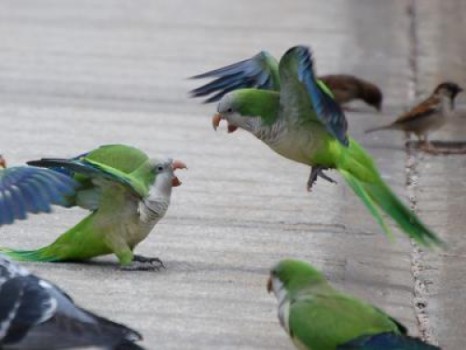Science has learned a great deal about complex social behavior by studying nonhuman mammals and primates, but parrots might have something to teach too.
With their unusually large brains relative to their body size and advanced cognition, parrots live in a complex social environment — not merely in a large population of cooperating creatures, such as bees or ants, but in a dynamic setting of alliances and competitors. The same is true of the most intelligent mammals: dolphins, whales, primates, and social carnivores, like hyenas and lions.
A new study — the first to quantify the social lives of parrots using social network analysis — provides intriguing new insights into parrot sociality revealing a sophisticated social structure with layers of relationships and complex interactions.
In the study, researchers observed both wild monk parakeets in Argentina and captive ones in Florida to test several common but largely untested assumptions about parrot sociality.
Because parrots are often observed flying in pairs in the wild, one assumption is that parrot sociality revolves around the pair bond. But are the parrots flying with a true mate or simply flying with any individual?
Coupling the extensive field study with in-depth network analyses revealed that parrots — at least those in captive groups — do show a strong preference for associating with a specific individual and are usually found nearby their mate. In addition, the social networks of captive groups were highly connected with very strong associations with one or two other individuals, multiple moderate associates, and only a few weak associates.
In addition to these positive social relationships, captive monk parakeet groups were also structured by aggression. Researchers used observations of winners and losers in aggressive encounters to assign individual parakeets a dominance rank.
Together, the new research shows that the social lives of monk parakeets are structured by several types of relationships. In order for individuals to recognize where they fit in to the social structure of their group, they would need to recognize and remember others in their group, to remember how they interacted with specific individuals, and to remember the outcomes of those interactions. Managing this process may require significant cognitive skills.
Source: Science Daily
N.H.Khider

